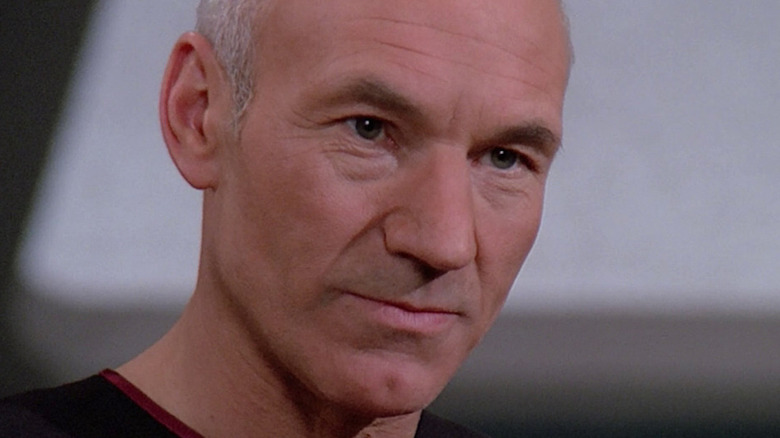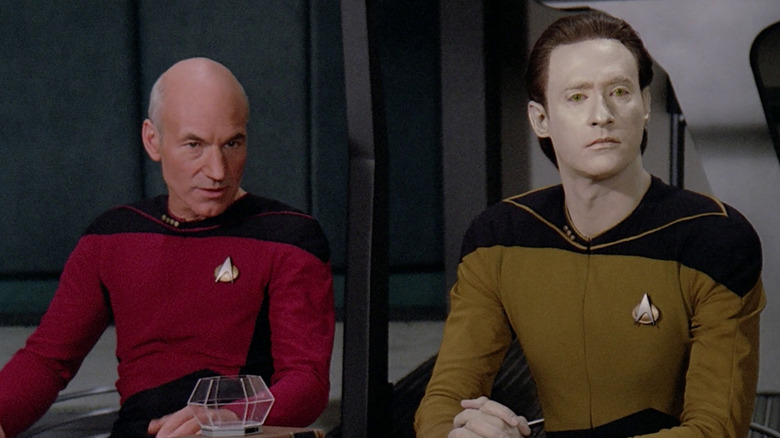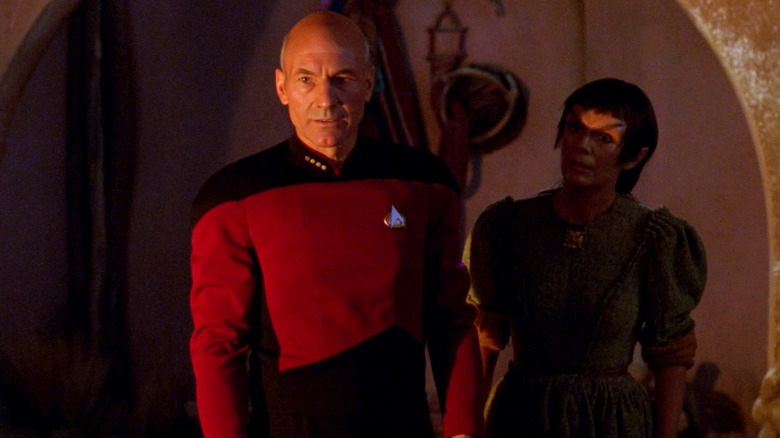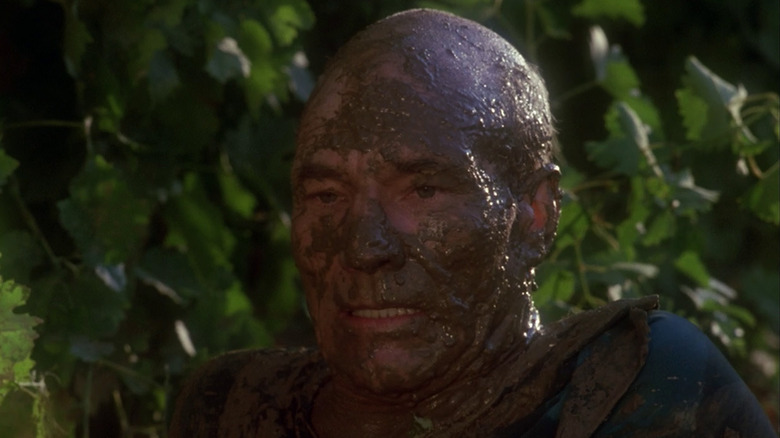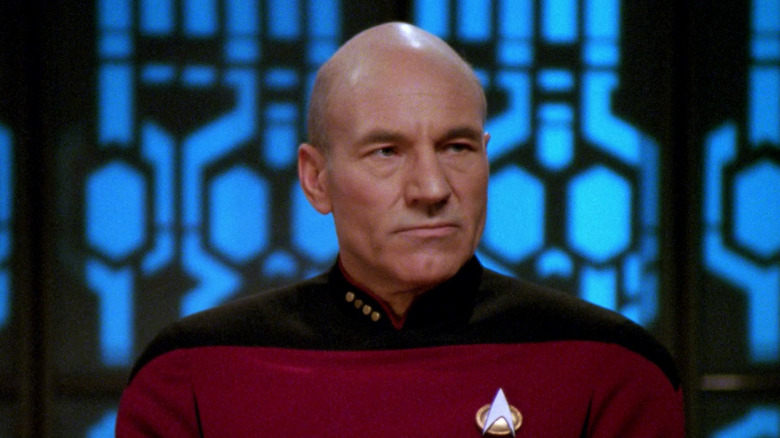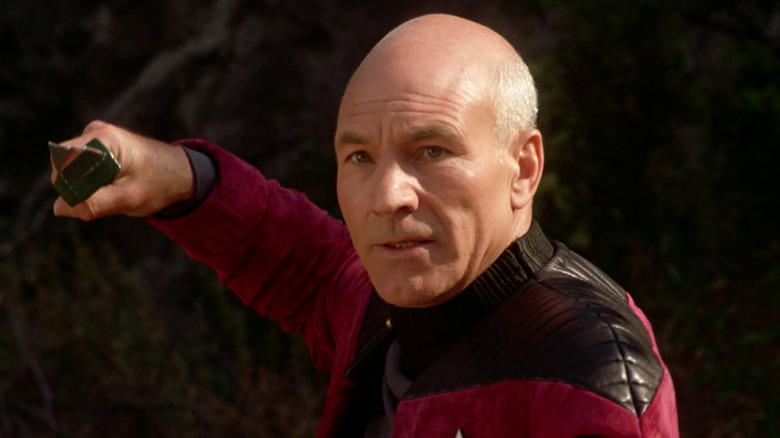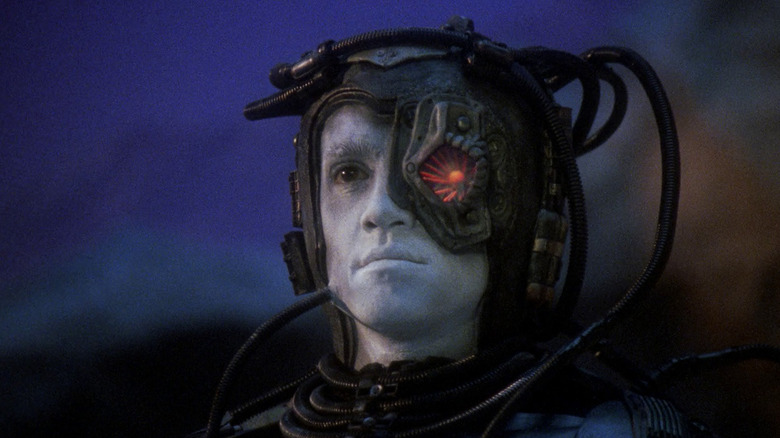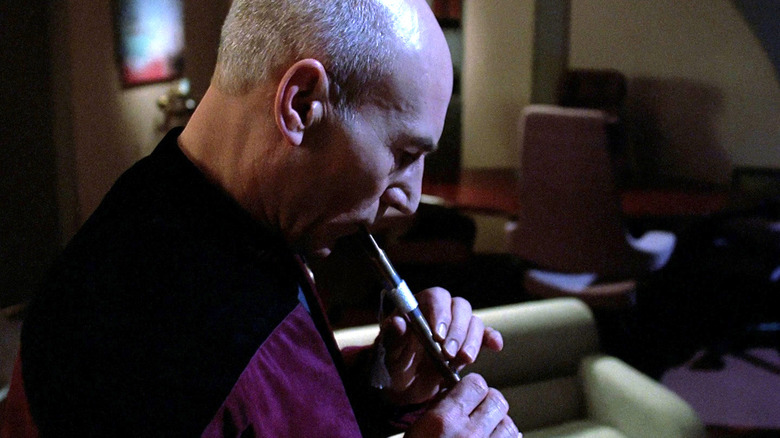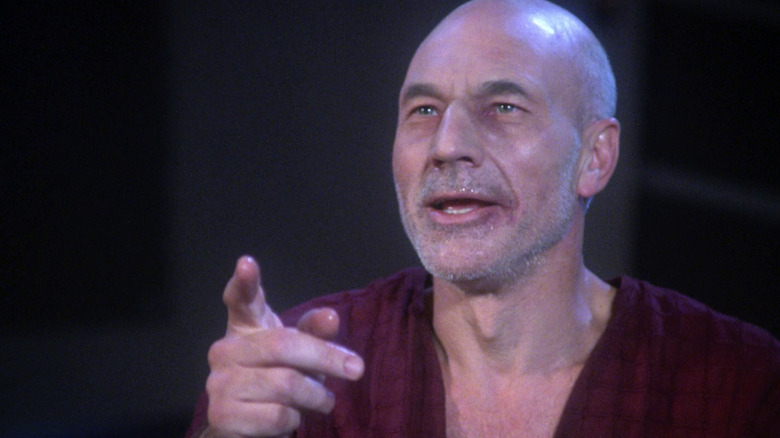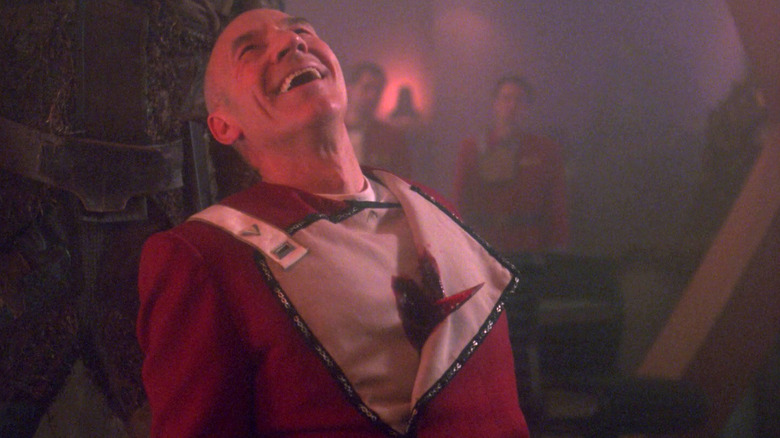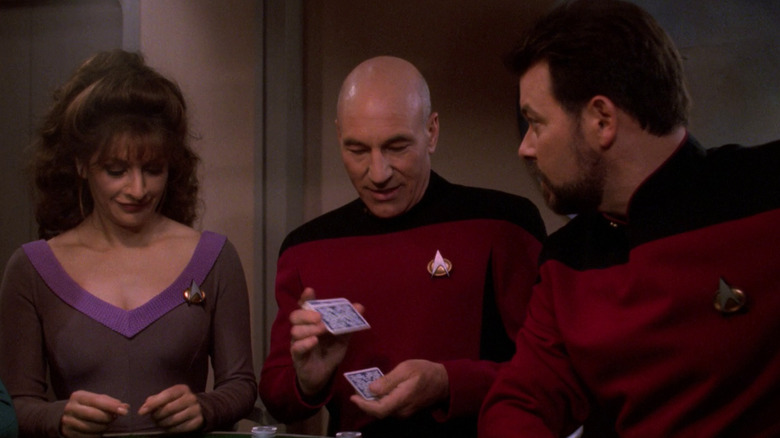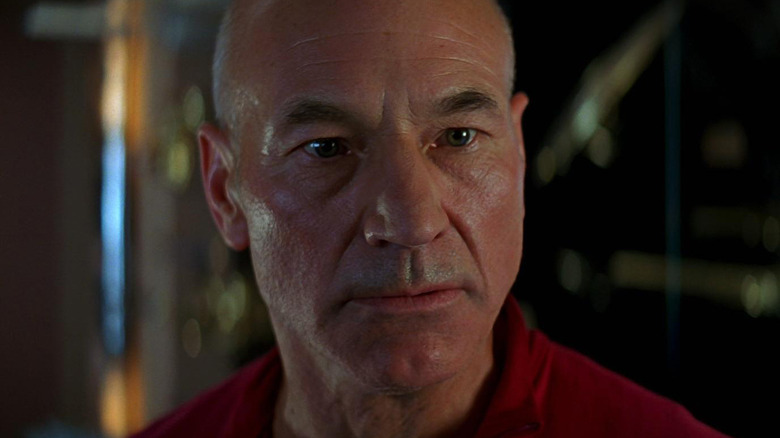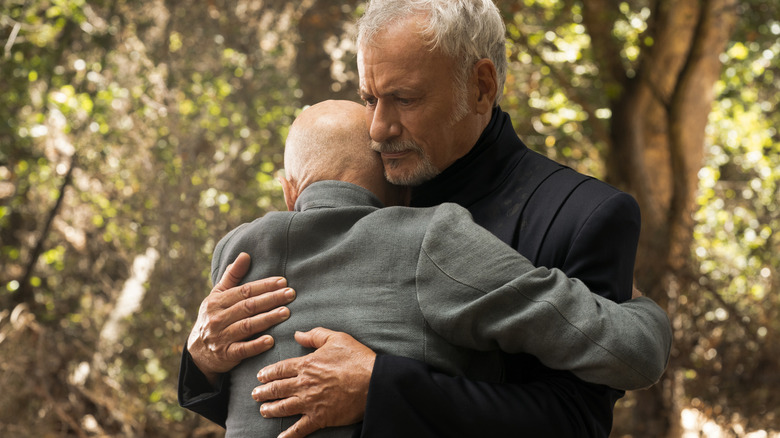Jean-Luc Picard's 12 Greatest Moments Of All Time
When "Star Trek: The Next Generation" first debuted in 1987, fans could hardly have imagined that this controversial spinoff would become one of the most celebrated sci-fi television series of all time, in some ways even eclipsing the original "Star Trek." "The Next Generation" not only grew into a hit series in its own time (whereas the original only truly took flight in syndicated reruns), it would launch a renaissance for the franchise, culminating in three consecutive spinoffs, four feature films, and a standing attraction in Las Vegas.
But perhaps the biggest surprise out of "The Next Generation" was the popularity of its captain, a bald, middle-aged intellectual who was a marked departure from the original Trek's dreamy alpha male James T. Kirk. Captain Jean-Luc Picard, portrayed by British actor Patrick Stewart, became a pop culture icon in his own right, popular enough to lead the "Next Generation" to a successful seven-season run, succeed Captain Kirk as the lead of the "Star Trek" film franchise, and eventually return for his own spinoff series in 2020. With "Star Trek: Picard" now gearing up for its farewell season, we've taken a look back at the character's history to celebrate some of his most shining onscreen moments.
Picard protects Data's right to personhood
Compassion is an essential characteristic for any Starfleet captain, but few demonstrate as much commitment for the pursuit of social justice and the preservation of individual liberties as Jean-Luc Picard. He believes deeply in the right of all life forms not only to survive, but to thrive, so long as they do not trample the rights of others. Of course, in the exotic travels of a starship captain, even these firm ideals can be met with challenging questions. For instance: "What is life?"
In "The Next Generation's" first truly great episode, Lt. Commander Data refuses to participate in a dangerous experiment that might result in producing more advanced androids like himself. When Data resigns his commission, the rebuffed cyberneticist has Data declared a non-living thing that is the property of Starfleet, compelling him to participate in his experiment. It's up to Picard to argue before a Starfleet Judge Advocate General (with whom he used to be romantically involved) that Data is not a piece of equipment, but a sentient being with all the rights of an organic life form.
Arguing against reluctant opposing counsel Will Riker, Picard struggles to make the case against an experiment that could potentially result in a legion of androids who could perform dangerous or tedious tasks in place of organic beings. But soon, with the help of his close friend and confidant Guinan, Picard comes to realize that failure to codify Data's rights might condemn an entire new race of beings to slavery. Picard's impassioned closing statement at Data's hearing firmly declares Data to be exactly the sort of "new life" that Starfleet was founded to seek out and protect, and sways the judge to acknowledge the personhood of synthetic beings under the law.
Refusing godhood
While respectful of the beliefs of others, Jean-Luc Picard is not terribly fond of religion. To him, superstition is an enemy of progress, an obstacle that a civilization must overcome in the course of its evolution. So imagine his horror when, after the Enterprise rescues a hidden research team on the planet Mintaka III, a village on the planet begins to worship him as a god. Starfleet's Prime Directive demands that Picard minimize any cultural contamination caused by their visit, but more than that, Picard is horrified by the prospect that a religion might stem from one Mintakan's brief glimpse of him, and that there's no way to predict what decrees (or atrocities) might be made in his name.
As the situation spirals out of control, Picard finds that the only way to repair the damage caused by his intervention is to intervene further, first transporting the village's leader Nuria up to the Enterprise to clear up the misunderstanding, then traveling down to the village to speak to its most devout believer, Liko. When Liko — a grief-striken widower who believes Picard can resurrect his wife — refuses to abandon his worship, Picard challenges Liko to shoot him with his bow and arrow. If not for Liko's daughter, Oji, spoiling his aim, Liko's arrow would likely have killed Picard. The captain survives, but his injury is enough to demonstrate that he is flesh and blood, just like the Mintakans.
The illusion of his godhood shattered, Picard departs Mintaka III as a different kind of inspiration, evidence that the wisdom and power they associate with the supernatural is something that they, as mortal beings, will achieve in time.
Picard confronts the trauma of his Borg encounter
In the celebrated two-part episode "The Best of Both Worlds," Captain Picard is captured and assimilated by the Borg Collective, becoming their cybernetic figurehead Locutus. This is, without a doubt, the darkest chapter of his life, as he's forced against his will to use his knowledge and experience to destroy a fleet of Federation starships and kill thousands of fellow officers and civilians. Even after his rescue and physical recovery, it takes decades for Picard to put the anguish of this ordeal behind him.
This healing process begins in the episode "Family," the epilogue to "The Best of Both Worlds," in which Jean-Luc returns to his home village of La Barre, France, and confronts his older brother and rival, Robert. Though Jean-Luc is initially unwilling to admit how deeply the Borg affair has wounded him, Robert's antagonism draws out his deeper feelings, leading to the two men fighting in the mud of their family's vineyard.
From appearances, this may seem like Picard hitting rock bottom, but it's actually a crucial turning point, as the traumatized captain finally drops his guard and confesses his pain over the Borg's violation of his mind and body. Picard is suddenly vulnerable in a way that he's never been before. This turns out to have been exactly Robert's plan, to use his leverage as Jean-Luc's bullying older brother to cut through his pretense and quiet self-pity.
"Family" is a tremendous piece of acting from Patrick Stewart and an essential moment for Picard as a character, allowing him to drop the facade of the larger-than-life captain and be, for his own sake, a human being.
Picard ends Admiral Satie's witch hunt
One thing you can say about Jean-Luc Picard: the man can give a speech. Patrick Stewart has delivered a variety of memorable monologues across his long tenure as Starfleet's most dignified captain, but his testimony at the tribunal in "The Drumhead" may be his very best. In this episode, Picard welcomes aboard legendary investigator Admiral Norah Satie to root out a potential seditious conspiracy aboard the Enterprise. The ship's Klingon exchange officer has turned out to be a Romulan spy, and Satie doesn't believe he could be working alone.
Before long, however, Picard grows concerned that Satie's search for a hidden enemy has become overzealous and adversarial, infringing upon the rights of suspects. Satie publicly interrogates a young crewman, Simon Tarses, and uncovers that he has been hiding a Romulan ancestry. But, so far as Picard can tell, Tarses is guilty of nothing but withholding personal information when he enlisted in Starfleet. Satie and her team make a spectacle of Tarses' trial, despite any further evidence against him. Picard decides that he's had enough, standing up to his superior officer at the risk of his command and his career. Called to the stand himself, Picard challenges Satie's tactics and intentions, refusing to enable her witch hunt any further.
"Have we become so fearful ... so cowardly," says Picard, "that we must extinguish a man because he carries the blood of a current enemy?"
Later, evoking the words of Satie's beloved father (himself a trial lawyer and champion of civil liberties), Picard is able to subvert Satie's rhetoric, provoking her into an unhinged rant that turns the opinion of the Admiralty against her and puts an end to the inquest. As ever, Picard demonstrates the overwhelming power of reason and compassion over fear and hatred.
Picard and Dathon at El-Adrel
Though a skilled combat commander and a bit of a closet adventurer, Picard is first and foremost a peacemaker. "In my experience, communication is a matter of patience [and] imagination," says Picard in the episode "Darmok," before making contact with the supposedly "incomprehensible" Tamarians. His patience is tested to its limit when he learns that the Tamarians speak in untranslatable strings of literary and historical references for which outsiders have no frame of reference.
Unable to establish a dialogue, the Tamarian Captain Dathon has both himself and Picard beamed down to the dangerous planet below, where the two must learn to communicate while being hunted by a dangerous predator. Over the following day, Picard learns to understand the Tamarian's metaphorical language and forms a brief but profound bond with his companion, preventing an all-out war and vindicating his philosophy of peaceful coexistence between cultures.
The "Darmok" incident is not only an exciting and heartwarming chapter of "Star Trek: The Next Generation," but a shining example of Picard's philosophy at work. While the Enterprise and the Tamarian ship try to overpower each other in orbit, Picard and Dathon place their trust in each other and, when words fail them, demonstrate their good faith through action.
Borg genocide prevented
Though over a year removed from his abduction by the Borg, Jean-Luc Picard still carries deep emotional scars, a rage and hatred for the cybernetic beings that runs counter to his core values as a compassionate diplomat. This ugliness rises to the surface in the episode "I Borg," when the Enterprise happens upon an injured Borg adolescent who has been separated from the collective hive mind. Shockingly, Picard's first instinct after discovering this young cyborg is to deliberately infect him with a computer virus and send him back home to spread the disease through the entire collective, potentially destroying them once and for all. As out of character as this seems, Starfleet even approves this genocidal tactic, itself shaken by the recent Borg invasion.
It takes the intervention and influence of those close to him to bring Picard to his senses. First, Lt. Commander Geordi La Forge bonds with the Borg, learning that separation from the collective has restored his individuality and capacity to make his own decisions. La Forge shares his reservations with Guinan, the ship's bartender whose own planet was destroyed by the Borg, who in turn challenges Picard to look their enemy in the eye before using him as a weapon. Once Picard sees his foe as a person rather than an idea, he finds that he cannot in good conscience follow through with his plan.
Picard has often railed against the hatred in the hearts of others, but it's another thing altogether to conquer one's own. "I Borg" is nearly Picard's gravest mistake, a betrayal of his principles and a grievous crime against sentience. Instead, it's a moral victory, a triumph of hope over fear.
The song of the Ressikan flute
Jean-Luc Picard has always considered himself a private, self-sufficient man, but this has left some emptiness in his heart. Many of "The Next Generation's" brightest moments come from the rare occasions in which Picard truly opens himself to others, and there's no more dramatic example than "The Inner Light." In this all-time great episode, Jean-Luc becomes mentally tethered to an alien space probe, which causes him to experience life amongst their culture. Experiencing decades in the space of 25 real-time minutes, Picard discovers the joy of marriage, parenthood, and community.
In this telepathic simulation, Picard wakes up as Kamin, a craftsman in the quiet village of Ressik. Though he remembers his life as Picard, he's totally separated from it and eventually finds new purpose as a husband, father, and local public servant. By the time he dies of old age, the experience of being a career-driven starship captain with no interest in settling down feels like a half-forgotten dream. But when he awakens on the bridge of the Enterprise, he can clearly recall the memory of both lives, having learned not only of the beautiful ways of a long-lost civilization, but of the everyday pleasures of life that he's always denied himself.
"The Inner Light" closes on a scene of Picard, alone in his quarters, playing a Ressikan flute that is his only memento from the life he's just lived. His lonely performance of a folk song that he once played for his vanished family is one of the most compelling and heartfelt moments in the history of the character.
There are four lights!
In the two-part episode "Chain of Command," Captain Picard is reassigned to a covert operation to disarm a Cardassian weapon of mass destruction. This turns out to be a ruse to capture Picard and interrogate him for fleet secrets ahead of an incursion. Held prisoner and tormented by the cold and clinical Gul Madred, Picard withstands days of torture, bearing the abuse on his body and mind while attempting to engage with his captor and find the feeling person within. If he can't appeal to Madred's conscience, then careful study might at least help Picard find a weak spot in his psyche and apply precise, devastating pressure to it.
Throughout the interrogation, Madred occasionally asks Picard how many lights are shining into his eyes. There are, in fact, four of them, but Madred, who insists that there are five, physically tortures Picard for telling the truth. Madred knows that, once Picard relents and gives him the answer he wants, he'll have broken his spirit, but Picard doesn't surrender, even after the psychological pressure of prolonged abuse causes him to hallucinate a fifth light over his head.
Picard survives long enough to be rescued, confounding Gul Madred, but this story is not merely about the bravery or fortitude of Picard. It's about the senseless evil of torture, an unreliable form of intelligence gathering whose only use is making the practitioner feel powerful. There is still some triumph here for Picard, however, as he refuses to give his torturer the satisfaction of knowing just how much this ordeal has weakened him.
Picard chooses to die his true self
The Picard we know from "The Next Generation" is seasoned, logical, and professional. He's tightly wound, even a little stiff, but he wasn't always that way. When he was a young man, "Johnny" Picard was a rabble-rouser, a cocky troublemaker who picked fights and broke hearts, even being stabbed through the heart in a bar fight that he himself provoked.
In the episode "Tapestry," Picard's nemesis — the omnipotent extra-dimensional imp known as Q — offers him the chance to return to his youth and live his life differently, which will allow him to avoid dying of artificial heart failure aboard the Enterprise. Picard accepts Q's offer and, clearly embarrassed by his younger self, and begins making more responsible choices that ensure his survival in the present. However, Picard's avoidance of his life-changing barroom brawl also redefines the rest of his life, assuring that he grows into an unambitious, unmemorable nobody who commands neither the Enterprise nor anyone's respect. In a cross between "A Christmas Carol" and "It's a Wonderful Life," Picard visits a revised present in which a meek, gutless Lieutenant Picard sulks about the USS Enterprise, devoid of the passion or ambition that made him the man he was.
Picard, having learned a valuable lesson about himself, chooses to reverse his changes and embrace his sordid past as a part of his being, even if that means dying before his time. He's returned to the moment of his fightful bar fight and, upon seeing his opponent's blade pierce through his chest, laughs out loud. This is enough to satisfy Q, who decides to let him have his cake and eat it, too, restoring the past and also saving Picard from his would-be death.
A poker game seven years in the making
The series finale of "Star Trek: The Next Generation" sees Picard once again thrown through time by the omnipotent trickster Q. Now bouncing between three different time periods — his present, seven years in the past, and 25 years in the future — Picard solves a complex puzzle and prevents himself from accidentally triggering the annihilation of all life in the galaxy. One might imagine that this would be the achievement from this episode that we're looking to celebrate, but in fact, the far more powerful moment comes in the final scene of the series, when Jean-Luc finally sits down to join the rest of the bridge crew's friendly poker game.
Throughout "The Next Generation," Picard has attempted to maintain a professional distance from his shipmates. This adventure, however, has sent him back to when he first met his companions, allowing him to measure how much they've all grown towards each other, and into a future in which circumstances have driven them apart. Now, returned to a stable present, Jean-Luc Picard chooses to accept his Enterprise family into his heart and treasure the time they have together. It's a moving capstone to the arc of the character throughout the series, one that's bound to move any devoted viewer to tears. Just look any Next Gen Trekkie in the eyes, say "Five card draw, nothing wild, and the sky's the limit," and watch them well up with tears.
Picard draws a line, then steps back from it
"The Next Generation" came to an end in 1994, but the journey of Jean-Luc Picard was far from over, as Patrick Stewart reprised the role across four feature films and three seasons of his spinoff series, "Star Trek: Picard." These post-"TNG" works show a different, darker side of the character, one who faces graver stakes with greater frequency and who is often confronted with his own mortality and legacy.
In the feature film "Star Trek: First Contact," Picard has his long-awaited rematch with the Borg, the cybernetic hive mind that once used him as a weapon against his own people. As in "I Borg," this brings out Picard's vengeful side, but the all-out conflict aboard his ship between the Borg and his crew also inflames his temper, leading him to make irresponsible decisions in the name of extinguishing his enemy. Rather than evacuate the Enterprise and set it to self-destruct, eliminating the Borg threat but sacrificing his ship, Picard orders the crew to engage the Borg head-on, which will certainly cost many of them their lives.
"The line must be drawn here," says an enraged Picard, "This far, no further! And I will make them pay for what they've done!"
With the Enterprise crew too loyal to challenge his authority, it falls to outsider Lily Sloane to shake some sense into Picard. With her help, Picard recognizes in himself an Ahab-like obsession to punish the Borg at any cost, and is able to wrest control of himself. With a clear head, Picard manages to defeat the Borg Queen, rescue the captured Lt. Commander Data, and save both the Enterprise and the planet Earth without losing his soul.
Picard finds forgiveness and embraces his nemesis
The spinoff series "Star Trek: Picard" is, at best, a mixed bag, failing to ossify as a "legasequel" that passes the torch to a new set of characters and eventually devolving into a straight-up "TNG" reunion. However, along the way, "Picard" does put in some quality time developing its title character, exploring both his golden years as an aged admiral and his traumatic childhood. Two episodes from the (deeply flawed) second season tie together an emotionally resonant story of Picard learning to let go of his grief and guilt over the untimely death of his mother, and to find more room for love and forgiveness in his heart in general.
The episode "Monster" sees Jean-Luc revisit and re-contextualize difficult childhood memories that help him to see his father Maurice (guest star James Callis) as a complex person rather than a cruel tormentor. He learns to understand his father's actions and his mother's mental health struggles, and to forgive himself for being unable to prevent her suicide.
This opportunity to overcome his inner demons turns out to be a gift from a dying Q, who has once again sent Picard through time to teach him a lesson about himself. The season finale "Farewell" culminates with a final meeting between Picard and Q, in which Picard sets aside their decades of conflict and embraces him, comforting him in the final moments of his life. However disappointing "Picard's" second season was as a whole, this tearful goodbye between two characters packs a powerful punch, not just as a goodbye to Trek's greatest antagonist but as the culmination of decades of Jean-Luc Picard's personal growth.
